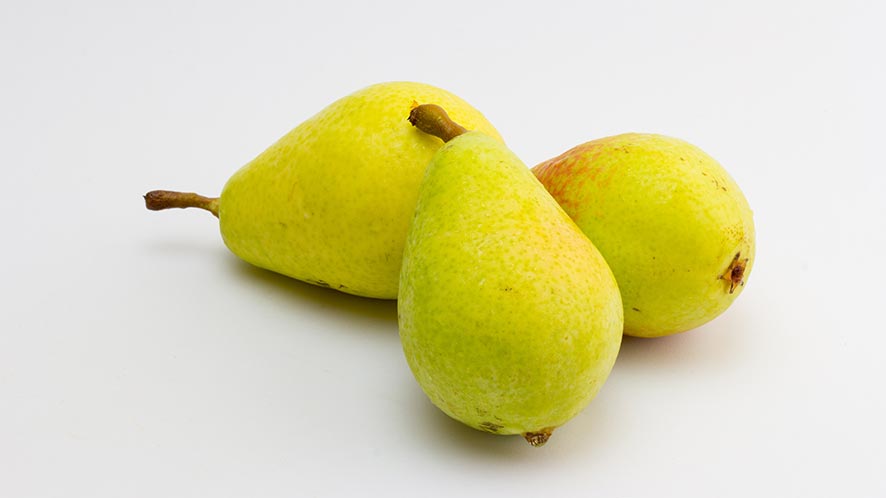Pear Nutritional Value and 11 Health Benefits
Belonging to the tree species scientifically known as genus Pyrus, the pear is a pomaceous fruit known to humans since prehistoric times. The cultivation of it extends to the utmost antiquity where the climatic conditions are fresh and temperate. Apple, a popular fruit belongs to the same species and has a floral structure that resembles a pear.
Like an apple, a pear is a fruit with several seeds in it. The color of its skin varies from yellow, to brown, red, and green. Juicy, sweet, and usually mild, pears are available in a large variety in the market. The Bosc variety has a long tapered neck, generally brown and less juicy. The Anjou’s variety is oval-shaped, yellowish-green in color, and is cultivated in winter.
The Bartlett’s variety, bright yellow in color and very sweet and juicy, is available during the summers. Available during the late fall, the rounder and green-skinned Comice variety tastes the best and is sweet and very juicy. A detailed chart with the nutritional values and health benefits given below will explain why pears should be introduced into our daily diet.
Pear Nutritional Value and Facts
Amount of Pears: 1 cup (halves)
Total Weight of Pears: 180 g
| Nutrients | Amount |
| Basic Components | |
| Protein | 47.3 kJ |
| Water | 48.0 g |
| Ash | 2.0 g |
| Calories | |
| Total Calories | 1976kJ |
| Calories From Carbohydrate | 1888kJ |
| Calories From Fat | 39.8kJ |
| Calories From Protein | 47.3kJ |
| Carbohydrates | |
| Total Carbohydrate | 125g |
| Dietary Fiber | 13.5g |
| Sugars | 112g |
| Fats & Fatty Acids | |
| Total Fat | 1.1g |
| Saturated Fat | 0.1g |
| Monounsaturated Fat | 0.2g |
| Polyunsaturated Fat | 0.3g |
| Total Omega-3 Fatty Acids | 3.6mg |
| Total Omega-6 Fatty Acids | 263mg |
| Vitamins | |
| Vitamin A | 5.4 IU |
| Vitamin E | 0.1 mg |
| Vitamin K | 36.7 mcg |
| Riboflavin | 0.3 mg |
| Niacin | 2.5 mg |
| Vitamin B6 | 0.1 mg |
| Pantothenic Acid | 0.3 mg |
| Minerals | |
| Calcium | 61.2 mg |
| Iron | 3.8 mg |
| Magnesium | 59.4 mg |
| Phosphorus | 106 mg |
| Potassium | 959 mg |
| Sodium | 10.8 mg |
| Zinc | 0.7 mg |
| Copper | 0.7 mg |
| Manganese | 0.6 mg |
| Selenium | 0.4 mcg |

Health Benefits of Pears
- Pear juice is commonly the first juice introduced to infants as it is less allergenic than other fruit juices.
- Vitamin K content in a pear helps in blood clotting. It also has the potential to prevent diseases such as stroke and other heart diseases.
- The Vitamin C content in a pear is one of the main compounds that help in the proper functioning of the body such as in the regulation of cholesterol levels, fat transformation, improving immunity in the body, and proper brain functioning.
- The fiber content in a pear helps in proper digestion. Very good for diabetics, pears are also useful as they help in overcoming constipation and intestinal inflammation.
- Colon cancer can be prevented with the intake of a pear because of the fiber and copper contained in it.
- Having a pear can help build up the immune system because of the anti-oxidant nutrients present in it.
- As pear is rich in copper and Vitamin C content, it acts as a good anti-oxidant that guards the cells against being damaged by free radicals.
- Pear has a terrific cooling effect. Thus, it is a vital fruit to have in order to reduce fever.
- Because it is rich in Vitamin B-complex and potassium, the pear is good for the heart and to maintain blood pressure.
- Pear is an exceptional source of water-soluble fiber. So, regular intake of pear juice helps in regulating bowel movements.
- Drinking boiled pear juice with honey helps in healing throat infections and vocal cord problems.
The nutritional facts and health benefits listed above surely should be able to persuade you to make pear a part of your daily diet.
Embracing Nutritional Bounty
Pears, an age-old fruit cherished across civilizations, present an extraordinary amalgamation of taste and nutrition. Exploring its variegated hues, flavors, and nutritional richness unveils a compelling case for integrating pears into our daily sustenance. The comprehensive breakdown of its nutritional profile beckons a closer look, offering a gateway to understanding its manifold health benefits.
Unveiling the Nutritional Treasury
Delving into the nutritional composition of pears unveils a spectrum of vital components. From carbohydrates and fats to an array of essential vitamins and minerals, pears stand as a reservoir of sustenance. With high water content and low-calorie attributes, they emerge as a delicious yet healthful addition to our diet, fostering overall well-being.
Pear: A Gateway to Wellness
The multifaceted health benefits associated with pears are nothing short of remarkable. From aiding digestion to bolstering the immune system and mitigating risks of chronic ailments, this unassuming fruit emerges as a powerhouse of wellness. Its role in preventing diseases, fortifying bodily functions, and even aiding in the recovery from certain ailments underscores its significance in promoting holistic health.
Advocating Pear’s Role in Holistic Health
The richness of vitamins like K, C, and B-complex, and the abundance of minerals including copper, potassium, and magnesium delineate the pivotal role pears play in fortifying various bodily functions. Whether it’s the digestive system, heart health, or immune resilience, the pear’s nutritional bounty caters to a diverse spectrum of health requisites.
Culinary Versatility and Healing Potency
Beyond its nutritional prowess, pears exhibit culinary versatility and therapeutic potential. From being a palate pleaser in its natural form to offering relief from ailments like constipation, throat infections, and fevers, the pear transcends mere sustenance. Its adaptability in various culinary forms further enhances its appeal, making it a delectable yet health-conscious choice for all.
Paving the Path to Nutritional Wellness
The amalgamation of nutritional value and health benefits weaved into the fabric of pears urges us to reconsider our dietary choices. Its ability to seamlessly blend into various culinary concoctions and its potential to elevate our well-being underscores the importance of incorporating this fruit into our daily regimen.
In conclusion, the nutritional grandeur and health-boosting capabilities of pears serve as a beacon guiding us toward a more conscious and health-centric lifestyle. By embracing this fruit’s wholesome offerings, we not only satiate our taste buds but also pave the way for a more robust and nourished existence. Let the allure of pears beckon us toward a path of holistic well-being and nutritional fulfillment.
